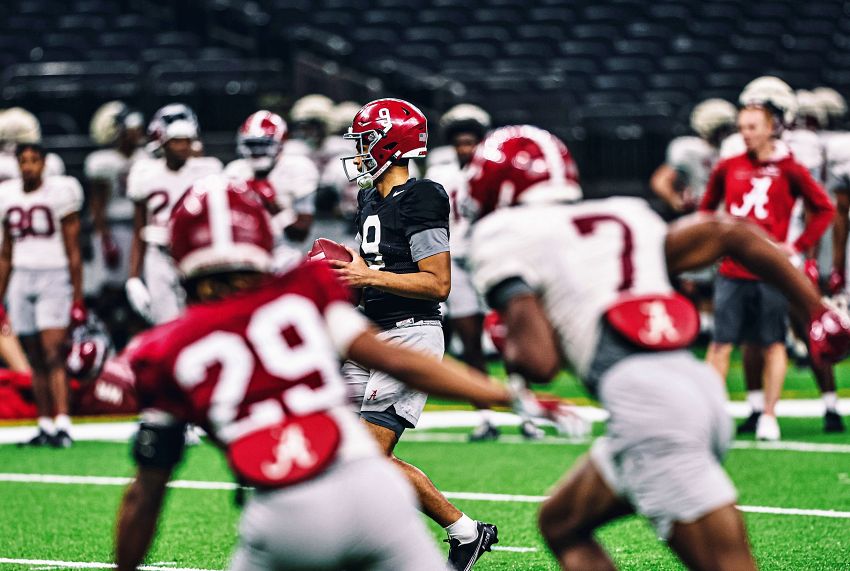Despite lack of fanfare, this Sugar Bowl is still what the event was meant to be

NEW ORLEANS – The college football national championship won’t be determined in the Sugar Bowl this season.
Nor will either of the College Football Playoff semifinal games be played in the Sugar Bowl.
In fact the Sugar Bowl won’t even have its traditional prime-time TV spot on New Year’s night – or any other night. The game between No. 5 Alabama and No. 9 Kansas State in the Caesars Superdome will kick off at 11 a.m. of all times on Saturday, New Year’s Eve.
It’s reasonable to view the Sugar Bowl as a mere warm-up act for the CFP semifinals that will be played later in the day as No. 2 Michigan and No. 3 TCU meet at 3 p.m. in Phoenix and No. 1 Georgia and No. 4 Ohio State meet at 7 p.m. in Atlanta.
But to look at the Sugar Bowl in the context of this season’s TV schedule or even the CFP bracket is to miss the historical significance of the 89th Sugar Bowl.
This is precisely what the Sugar Bowl was designed to be.
College football has changed in a thousand ways since then, but the Sugar Bowl game that was played on the first day of 1935 when Tulane defeated Temple 20-14 in Sugar Bowl Stadium wasn’t appreciably different than the one that will be played on the final day of 2022.
The Sugar Bowl’s mission remains what it always has been – to create “the best game possible.”
Sometimes that means a national championship match-up. Nowadays it can meet a match-up that sends the victor to play for the national championship. In this case it means the highest-rated SEC team not in the CFP (Alabama) and the Big XII champion (Kansas State).
It’s the best game possible – and a pretty good one at that—not to mention a special holiday event.
Kansas State running back Deuce Vaughn is understandably tempted to forego his remaining college eligibility to enter the next NFL Draft. He might do that, and he might not.
He says he will make that decision after he plays in the Sugar Bowl even though it has become commonplace for NFL prospects that aren’t playing in the CFP to skip their bowl game and focus on preparing for their impending professional opportunity.
“The Sugar Bowl has been a game that I’ve wanted to play in since I was a little kid,” Vaughn said recently. “I’ve watched it every single year. From Alabama playing against Ohio State with Ezekiel Elliott, Alabama playing Clemson, Clemson playing Ohio State. To be in this type of game, it’s a game I’m going to relish and playing in the Superdome is big time.”
Vaughn’s memory of recent Sugar Bowls and players such as Elliott, now a Dallas Cowboy, are matched by Sugar Bowl followers of earlier generations’ similar memories of players and coaches such as Jerome Bettis, Deion Sanders and Peter Warrick, Bo Jackson, Dan Marino, Herschel Walker, Tony Dorsett and Vince Dooley, Archie Manning, Steve Spurrier, Johnny Vaught and Bear Bryant, Darrell Royal, Bobby Layne, Charley Trippi and Frank Broyles, Davey O’Brien, Sammy Baugh and Monk Simons.
This Sugar Bowl is fortunate to include players such as Vaughn and Crimson Tide quarterback Bryce Young and defensive end Will Anderson Jr., who delayed their draft preparations to participate.
“I think it’s a great example for college football that guys that are special players who have had great seasons and have won numerous awards choose to continue to play and support their team,” Alabama coach Nick Saban said.
The Crimson Tide have played in the Sugar Bowl more often than any other team as they make their 17th appearance. The Wildcats have never played in the Sugar Bowl before.
This too is what the Sugar Bowl was supposed to be – a reward for two fine teams that had fine seasons in a match-up that would be rare if not unique in the regular season. This is the first time Alabama and Kansas State have met in a football game.
Saban, who has coached in seven Sugar Bowls and won national championships here with LSU at the end of the 2003 season and with Alabama at the end of the 2011 season, called the Sugar Bowl “one of the most special bowl games that anybody could be involved in.”
Tide offensive coordinator Bill O’Brien has coached in two Super Bowls and said he was “honored” to coach in the Sugar Bowl for the first time.
“The history of the Sugar Bowl is awesome,” O’Brien said.
Over the non-championship years the Sugar Bowl often has paired an elite program such as Alabama against a rising program that is trying to become elite, such as Kansas State.
This Sugar Bowl is for the Wildcats what offensive lineman Cooper Beebe called “a statement game for our program.”
Beebe said his parents were due to arrive in New Orleans from Kansas City on Thursday after an overnight stop in Little Rock.
“Their flight got canceled and they said, ‘Who cares? We’re driving down to New Orleans.’”
The Sugar Bowl was never meant to be just a football game. It was a vehicle for attracting tourists to New Orleans and an opportunity for the players and coaches to immerse themselves in the community.
That has never changed regardless of the rankings of the participants.
The teams take part in community service events. In the Wildcats’ case, they paid a visit to Children’s Hospital.
“Everybody knows that we’re down here for a football trip,” Kansas State wide receiver Malik Knowles said, “but just to be able to give back to a community that we’re not used to and see the smiles on the kids’ faces when we interact and play with them, that was better than winning the game. Just seeing the impact we have on the youth is way more important than anything.”
- < PREV Hurts, Ramczyk return to practice Thursday ahead of Saints-Eagles
- NEXT > Big night for Crawford headlines LA Tech;s 91-69 win over UTSA
Les East
CCS/SDS/Field Level Media
Les East is a nationally renowned freelance journalist. The New Orleans area native’s blog on SportsNOLA.com was named “Best Sports Blog” in 2016 by the Press Club of New Orleans. For 2013 he was named top sports columnist in the United States by the Society of Professional Journalists. He has since become a valued contributor for CCS. The Jesuit High…





